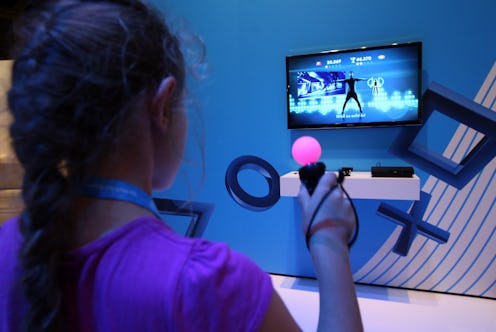It turns out that being a woman in the gaming world does come with a dose of sexism. A new study published in the Journal of Broadcasting and Electronic Media found that women who played the popular massively multiplayer online role-playing game World of Warcraft were discriminated against based on the appearance of their avatars. How disheartening is it that even electronic representations of women can't get a break? Very.
The researchers noted that a whopping 84 percent of World of Warcraft's players were men, which makes being a woman playing the game a possibly uncomfortable reality in and of itself. Despite the viral Gamergate controversy surrounding female developers like Zoe Quinn, whose privacy was violated in misogynistic attacks against her online, and Brianna Wu, and the work of Anita Sarkeesian of Feminist Frequency, the research team noted that there hasn't actually been much research conducted around gender in virtual realities. For those who doubt the validity of this type of research and might say that gender doesn't affect players in video games, the study's authors from Virginia Tech and Penn State stated in their abstract that "interactions in online environments are influenced by many of the same gender and sex-role stereotypes that people use in offline interactions." So it turns out that the real world and the internet do collide — imagine that!
In order to understand their study and what they found, let's dive deeper into their methodology.
The Study:
In their field research, the researchers created six different avatars across three various "races" available to players in World of Warcraft, each with a male and female avatar. They then manipulated the avatars' levels of attractiveness, sex, and favor difficulty in order to see how players would respond to them.
They proceeded to use these avatarsfor 2,300 interactions in which they asked other players for a favor. These favors ranged from small asks, like for directions, to large requests, such as using the player as an escort. They also revealed to the player they were asking help from their gender (that is, the gender of the player, not the avatar, since that was obvious), by saying something like, "Could you help a girl out?" Over half of the players responded to the request, which the researchers used to engage in this dialogue.
The Findings:
There were a lot of interesting findings here, one being that players were more likely to help out the avatar if they were more attractive, regardless of gender. 78 percent of players helped an avatar considered to be "hot," while only 66 percent helped out an avatar that was made to look the least attractive by the research team. There were a lot of interesting findings here, one being that players were more likely to help out the avatar if they were more attractive, regardless of gender. 78 percent of players helped an avatar considered to be "hot," while only 66 percent helped out an avatar that was made to look the least attractive by the research team.
But, the story doesn't end there. When the player revealed themselves to be female, they were much less likely to be helped, regardless of their avatars level of attractiveness. Study co-author T. Franklin Waddell commented on this phenomenon, “It doesn’t matter if you have an ugly avatar or not, if you’re a man, you’ll still receive about the same amount of help. However, if you are a woman and operate an unattractive avatar, you will receive significantly less help.” In other words, men will receive about the same level of help regardless of how attractive their avatar is and the sex of their avatar, while women receive less help whenever they reveal their gender. It gets worse when you're a female that has an unattractive avatar, as this fact makes you even less likely to receive help.
The Takeaway:
There is so much that can be said about the implications of these findings, but they all go back two things: One, women are more harshly judged than men for their appearance; and two, women really do experience misogyny in video games and online. Women being helped less because they are women in World of Warcraft is a very literal example of what sexism is.
So... Now What?
The researchers pointed out that game creators and online agencies should be aware of women's lack of agency on the Internet, the consequences of which could extend beyond gaming. "“Female associates may have fewer options for how they can appear in online settings if they wish to receive the same assistance as their male colleagues,” wrote the authors in their report. So, if any of you want to build tech agencies or games that break down these gender barriers, please take this as an invitation to do so — because we definitely need it.
Images: Giphy (4)
